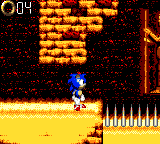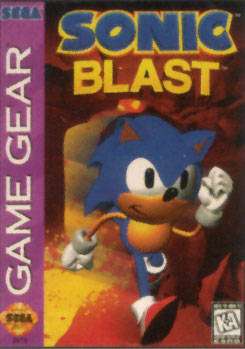Sonic Blast
| Sonic Blast | |
|---|---|
|
Cover art | |
| Developer(s) | Aspect |
| Publisher(s) |
‹See Tfd› ‹See Tfd› |
| Director(s) | Ryushin Hamada |
| Producer(s) | Hiroshi Aso |
| Composer(s) | Kojiro Mikusa |
| Series | Sonic the Hedgehog |
| Platform(s) | Game Gear, Master System, Nintendo 3DS (Virtual Console) |
| Release date(s) |
Game Gear‹See Tfd›
‹See Tfd› Master System‹See Tfd›
Nintendo 3DS‹See Tfd› ‹See Tfd›
|
| Genre(s) | Platform game |
| Mode(s) | Single player |
Sonic Blast is a video game in the Sonic the Hedgehog series developed by Aspect and published by Sega for the Game Gear. It was released in November 1996 in North America and in Japan a month later as G Sonic (Gソニック Jī Sonikku), being the last first party title released for the system,[2] and the second-last officially licensed Game Gear title (preceding 1997's The Lost World: Jurassic Park). It was later released in Europe in 1996.
The game was also ported to the Master System in Brazil by TecToy and released in December 1997.
Sonic Blast was later compiled with other Sonic titles in Sonic Adventure DX and Sonic Mega Collection Plus, and a demo of its ending can be unlocked in Sonic Gems Collection.
While this game was released in conjunction with the similarly named Sonic 3D Blast in North America, the games have little in common. No enemies, levels, or bosses are shared between them. The story is also completely different; Sonic and Knuckles join together to collect five of the Chaos Emeralds and confront Eggman at Silver Castle.
Gameplay

Unlike its pseudo-3D counterpart, Sonic Blast for Game Gear was a side-scrolling run and jump platform game. It was the last new Sonic the Hedgehog game released for the Sega handheld, and sported some of the most advanced features of the 8-bit series (although it was not very well received).
The two playable characters in the game are Sonic the Hedgehog and Knuckles the Echidna. The object of the game is to collect five Chaos Emeralds, in stages visually similar to the Sonic the Hedgehog 3 special stages, but instead require Sonic and Knuckles to collect rings as in Sonic the Hedgehog 2's special stages. Emeralds can only be obtained in the second act of each level. Finishing a special stage in the first act will gain the player an extra life instead. Similar to Sonic 3, special stages are entered through large rings hidden in the regular stages.
Much like Sonic Triple Trouble, when the player is hit by an enemy, he only loses some of his rings as opposed to all of them (in this game, 10 rings per hit). Sonic's maneuvers are similar to those in other games, but he has a special double-jump ability that allows him to reach greater heights, like with the electric shield in Sonic 3. Knuckles's abilities are his standard climbing and gliding, as seen in Sonic and Knuckles.
Graphics
A prominent feature of this game was its pre-rendered graphics, which had become popular in Nintendo's 16-bit hit Donkey Kong Country. The rendered graphics give the game a more advanced look than most other 8-bit games. The character graphics also took up a bigger portion of the screen.
Reception
The game received mixed reviews overall. Retrocopy gave it a score of 5/10 praising its level design, music and graphics while criticising the fact that the character graphics took up a large portion of the screen and that it had slower gameplay compared to previous 8-bit Sonic titles on the Game Gear.[3]
Defunct Games gave the game a C- stating that it offered "a much more traditional affair, the type that would probably appeal to a lot of die hard Sonic fans" however criticising the game's graphic style, sluggish controls and power-ups. They concluded their review by stating "That's not to say that Sonic Blast can't be enjoyed, but there are definitely more enjoyable 8-bit platformers on the Game Gear."[4]
References
- ↑ "[セガハード大百科] ゲームギア対応ソフトウェア(セガ発売)". Sega. Archived from the original on June 1, 2012. Retrieved 2015-06-04.
- ↑ "G Sonic". Retrieved 2007-01-24.
- ↑ http://www.retrocopy.com/forumthread/619-1/sonic-blast-review-by-tommy1983.aspx
- ↑ http://www.defunctgames.com/review/986/sonic-blast
External links
- Official 3DS eshop Minisite (Japanese)
- Official Nintendo Minisite (English)
- Sonic Blast at MobyGames
